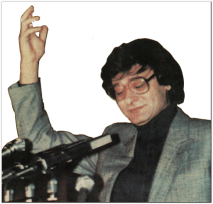 |
|
|
|
|
|
|
| Poetry in English | Poetry in Translation | Culture News | About Us | Write to Us |
|
Mahmoud Darwish - Palestine (1942 - 2008)
Poems in English
Mahmoud Darwish (1942-2008) Poet and journalist, an interpreter of the exile and hopes of the Palestinian people. Darwish's major theme in his poems is the fate of his homeland. He uses simple vocabulary and plain, recurrent images: an open wound ('wound that fights'), blood ('we will write our names in crimson vapor'), mirrors ('shape of the soul in a mirror'), stones ('my words were stones'), and weddings. Darwish often addresses the reader arguing fiercely, defending, and pleading, as a prophetic voice from a large supporting choir.
Mahmoud Darwish was born into a landowning Sunni Muslim family in al-Barwe, a village east of Acre. After the war of 1948, the Israelis occupied the village, and Darwish with his family became refugees. When a new Jewish settlement was built on Barweh's ruins, the family settled to another Arab village, where Darwish grew up. This experience, uprootedness, marked later deeply Darwish's life. After graduating from a secondary school, Darwish moved to Haifa. He worked in journalism and in 1961 he joined the Israeli Communist Party, Rakah, and edited for some time Rakah's newspaper, Al-Ittihad. During these years he experienced imprisonment and house arrest. Darwish studied in 1970 at a university in Moscow, USSR. He left in 1971 Israel and settled in Beirut, Lebanon, where he worked for the PLO and edited the monthly Shu'un Filistiniyya, Palestinian Affairs. Later he was appointed editor-in-chief of the Palestinian literary and cultural periodical, Al-Karmel. When Israel invaded Lebanon in 1982, the PLO abandoned its headquarters there and Darwish moved to Cyprus. He was elected to the PLO executive in 1987. Darwish wrote in 1988 the official Palestinian declaration of independence but five years later he resigned from his post in opposition to the the Oslo Agreement, which earned in 1994 the Nobel Peace Price to Yasser Arafat, Shimon Peres, and Yitzhak Rabin for their efforts to create peace in the Middle East. Darwish demand a tougher stand in the negotiations with Israel. In March 2000 Ehud Barak's government faced a political crisis following a proposal by the education minister to include Darwish's poems in the school curriculum. In 2001 Darwish reveived the Prize for Cultural Freedom established by Lannan Foundation. Darwish started to write poems while still at school. His first collection appeared in 1960 when he was only nineteen. With the second collection, Awraq al-zaytun (1964), he gained a reputation as one of the leading poets of the resistance. The work dealt with two general topic: love and politics. Gradually the love for a woman transformed in subsequent works into a unbreakable union between the poet and his homeland. "Her words and her silence, Palestinian, / Her voice, Palestinian, / Her birth and her death, Palestinian." (from 'The Lover') Qasidat Bayrut (1982) and Madih al-xill al'ali (1983) took their subject from the Palestinian resistance to the Israeli siege of Beirut during the summer of 1982. Beirut was bombed almost constantly from 13 June to 12 August to drive the PLO guerrillas out of the city. In English Darwish's anguished account of the invasion was published in Memory for Forgetfulness (1995). The text is fragmented, like a broken mirror. "To whom shall I offer my innocent silence?" asks the poet on the war-raveged streets, walking slowly, "that a jet fighter may not miss me." Images are nightmarish, the poet no longer waits for the end of the steely howling from the sea. In the middle of the infernal dawn, the writer says that "sleep is peace. Sleep is a dream, born out of a dream."
Darwish has received several awards for his work, including the 1969 Lotus Prize by the Union of Afro-Asian Writers, the Lenin Peace Prize in 1983, France's Knighthood of Arts and Belles Lettres in 1997, the Lannan Prize for Cultural Freedom in 2001, and Golden Wreath of Struga Poetry Evenings in 2007. Many of his heroic poems have become popular as songs. In 1999 the well-known musician Marcel Khalifeh was brought before the Beirut Court on charges of blasphemy. The charges related to his song entitled 'I am Yusuf, my father', which was based on Darwish's poem and cited a verse from the Qur'an. In this poem Darwish shared the pain of Yusuf (Joseph), who was rejected by his brothers. "Oh my father, I am Yusuf / Oh father, my brothers neither love me nor want me in their midst". Darwish has also used the lamentations Isaiah and Jeremiah from the Old Testament, to condemn injustice. Darwish has described the conflict between Palestinians and Israelis as "a struggle between two memories." Ibrahim Muhawi, his translator, has written that "his is a poetry of witnessing." In 1988 Darwish's doubtful poem 'Those Who Pass Fleeting Words' upset his Israeli readers, who considered it a call for the destruction of Jews. "O those who pass between fleeting words / It is time for you to be gone / Live wherever you like, but do not live among us / It is time for you to be gone / Die wherever you like, but do not die among us". Darwish himself has admitted that the poem was too slogan-like. Darwish led somewhat nomadic life. He lived in Lebanon, Cyprus, Tunisia, Jordan, and France. In 1996, after 26 years of exile, Darwish returned to Israel and visited his native village again. Since the mid-1990s, his home was in Ramallah, a central West Bank Palestinian town, where Yasser Arafat had his headquarters, and which became again a battlefield in 2002, when it was was reoccupied by Israeli army. Darwish died on August 9, 2008, in the Memorial Hermann Hospital in Houston, Texas, after undergoing open-heart surgery. Darwish was married twice, he had no children.
Selected bibliography:
|
||||||||||||||||
|
|
|
 |
 |
|
|
